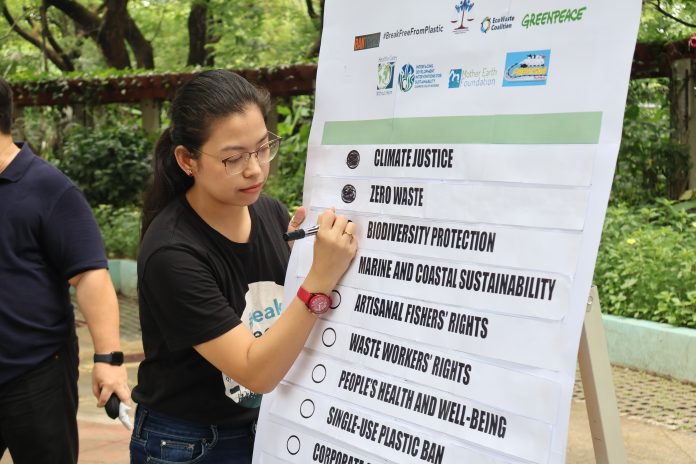Eighty-eight percent of Senate candidates have no clear environmental agenda, according to a green coalition urging voters to demand bold ecological leadership.
Only eight out of 64 senatorial aspirants responded to a pre-election survey by the 2025 Green Electoral Initiative, which sought to assess candidate positions on pressing ecological issues such as climate action, plastic pollution, biodiversity loss, and sustainable resource management.
“Only eight candidates responded to urgent environmental questions—that’s not just disappointing, it’s a red flag,” said Lea Guerrero, Country Director of Greenpeace Philippines.
“When climate justice is absent from platforms, it shows a dangerous disregard for the crises deepening hunger, worsening health, and driving poverty. We need leaders who will stand with people, hold polluters accountable, and put climate at the top of the agenda,” she added.
The initiative is supported by a coalition of environmental groups, including Greenpeace Philippines, Ecowaste Coalition, PANGISDA Pilipinas, Health Care Without Harm, Community Legal Help and Public Interest Center (C-HELP), Mother Earth Foundation, Interfacing Development Interventions for Sustainability (IDIS), BAN Toxics, and Break Free from Plastic (BFFP).
Candidates who submitted their environmental platforms include Leody De Guzman, Teddy Casiño, Luke Espiritu, David Delano D’Angelo, Jocelyn Santos Andamo, Norman Marquez, Mody Floranda, and Atty. Arnel Bondilles Escobal.
The coalition also acknowledged the past legislative work of former senators Francis “Kiko” Pangilinan—who authored the Sagip Saka Act and championed plastic regulation—and Gringo Honasan, who played key roles in the Clean Air Act and the Solid Waste Management Act.
Top-polling candidates, however, did not participate in the survey, despite a recent Social Weather Stations (SWS) poll showing that 92 percent of Filipino voters consider environmental and climate-linked issues—such as food security, disaster resilience, and poverty reduction—as key election concerns.
“The silence of frontrunners is a damning symptom of our broken political system,” said Von Hernandez, Global Coordinator of the Break Free from Plastic movement.
He criticized political aspirants for ignoring environmental crises while relying on dynastic politics, smear tactics, and theatrics, instead of championing genuine ecological leadership essential to the nation’s survival.
The groups also denounced existing government policies that they say promote environmental decline, including support for nuclear energy and waste incineration, the proliferation of single-use plastics, and efforts to open municipal waters to commercial fishing vessels.
To help guide voters, the coalition launched a “Survival Agenda,” which calls for: banning single-use plastics and advancing zero waste solutions; transitioning away from fossil fuels; upholding climate justice; protecting the rights of small fisherfolk, waste workers, and consumers; and rejecting false solutions such as incineration and nuclear energy.
Wes Lipana of the Ecowaste Coalition emphasized that the issue goes beyond policy, framing it as a struggle for clean air, safe food, and a livable future.
He pointed to worsening conditions—plastic-choked communities, eroding coastlines, and increasing threats to water and food safety—as evidence of an environmental emergency that requires strong and accountable leadership from those seeking public office.
Since 2004, the Green Electoral Initiative has evaluated candidates’ environmental commitments by sending surveys to those seeking national office.
The survey covers positions on climate, biodiversity, waste, energy, and environmental justice—exposing whether hopefuls have a concrete plan to address the country’s growing ecological crisis.









